Exploring Power Dynamics in A Clash of Kings
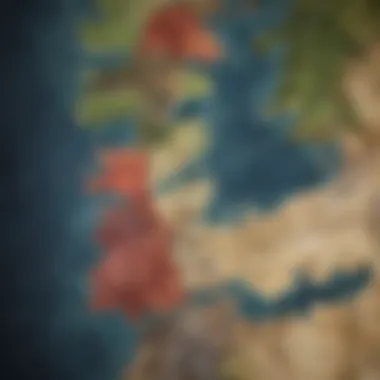
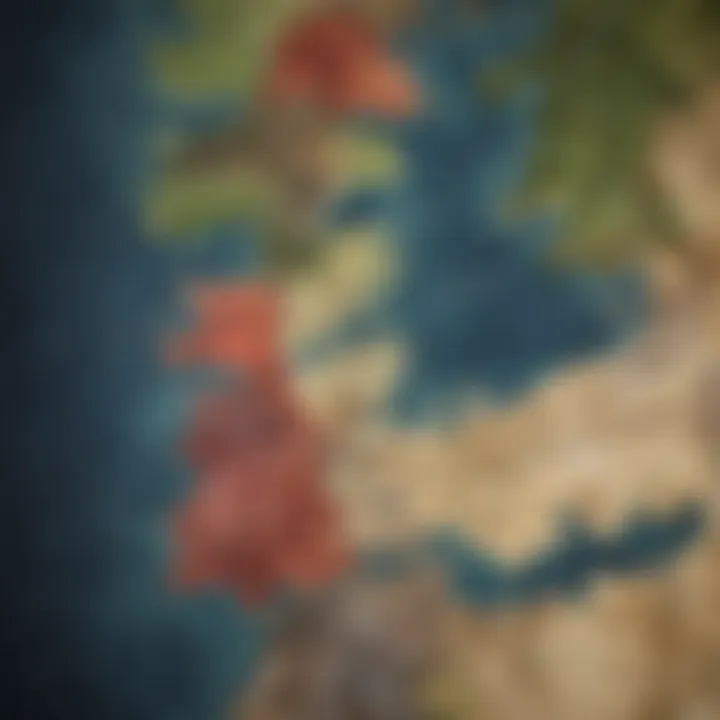
Intro
In the world of Westeros, power is not just a game; it is the very essence that defines the fates of its characters and the realms they inhabit. George R.R. Martin’s 'A Clash of Kings' presents a tapestry of intricate layers relating to political maneuverings, moral dilemmas, and the stark realities of warfare. Understanding these nuances requires an examination of characters that breathe life into this saga, showing that every step taken in this struggle for dominance carries weighty consequences not just for them personally but for all of Westeros.
The ambitions and motivations that lie behind each character's actions create both alliances and enmities, shaping the landscape of a divided kingdom. As the characters grapple with their internal conflicts, they reflect larger themes of loyalty, betrayal, and the quest for identity amid chaos. This exploration will consider various dimensions within 'A Clash of Kings', offering insights that resonate with both casual viewers curious about the deeper meanings and dedicated fans seeking to dissect the layers of their beloved series.
Character Dissections
Detailed analysis of key characters in Game of Thrones
Characters are the heart of 'A Clash of Kings'. Each one is meticulously crafted, possessing shades of grey that challenge simple categorization into heroes and villains. Take, for example, Tyrion Lannister, who balances his sharp wit with a deeply ingrained desire for acceptance and legitimacy. His astute observations lure him into the political arena, where he navigates treacherous waters using both intelligence and a touch of charm.
Conversely, we have Stannis Baratheon, a character driven by relentless ambition and a desire for righteousness, even at the cost of ruthlessness. His unwavering belief in his own destiny sets the stage for clashes that ripple through the story.
Character development throughout the series
The evolution of these characters reflects a vivid portrayal of human nature. Daenerys Targaryen starts off as a pawn in her brother's ambitions, but through hardship and resilience, she emerges as a formidable force. The arc of Jon Snow is equally compelling; raised in a world where nobility is tied to bloodline, his struggles to find his own place reflect the existential dilemmas many face.
Impact on the overarching storyline
The decisions made by key characters reshape the fate of entire houses and alter the course of history within the series. When Tyrion orchestrates the defense of King's Landing, it’s not just a battle; it symbolizes the broader struggle between intellect and brute strength that courses through the narrative. ___ "The Iron Throne doesn't belong to the strongest; it belongs to the most cunning." ___ This is a truth that runs deep in the veins of the story.
Political Intrigues
The political landscape in 'A Clash of Kings' is as vast as it is treacherous. A web of alliances, betrayals, and shifting loyalties define the relationships between the houses, each seeking to assert its own claim to power. The War of the Five Kings stands as a testament to the chaotic nature of ambition, showing how power can corrupt and isolate individuals.
Key agreements and betrayals include:
- The allegiance shift of Catelyn Stark, resulting in the freeing of Jaime Lannister.
- The growing tension between the Starks and the Lannisters, as mutual distrust escalates into a full-blown war.
These political machinations serve as a backdrop to personal stories, illustrating how the personal and political are intertwined in this brutal struggle for dominance.
Themes of Power and Morality
Themes of power are central to understanding the narrative of 'A Clash of Kings'. Characters grapple with moral quandaries that often dictate their long-term fates. Is it right to lie if it means protecting one’s family? At what cost does ambition come? The story doesn't shy away from exploring these tough questions, leaving the readers with more questions than answers. Each decision can be seen as ripples that create waves in the sea of Westeros' fate, ultimately steering the characters toward their destinies.
The interplay of personal relationships against the framework of vast political and social transformations creates a compelling narrative that encourages readers to reflect on the nature of power itself.
In summary, 'A Clash of Kings' provides rich material to dissect from multiple angles—characters, political intrigue, and the themes interwoven throughout the book are essential to understanding the overall narrative of the series. As we peel back the layers of this complex tapestry, we see that power truly shapes destinies in ways that are both profound and unsettling.
Preamble to 'A Clash of Kings'
The second installment of George R.R. Martin's epic saga, 'A Clash of Kings', serves as a cornerstone in the overarching narrative of A Song of Ice and Fire. This book is not just a continuation; it’s a deepening of the intricate layers of power struggles, alliances, and the chaotic realm of Westeros. Understanding this installment is crucial for grasping the complexities that unfold in both the political landscape and the personal journeys of its characters.
As the title suggests, the theme of conflict permeates the story. Power is not simply a goal; it’s a multifaceted weapon wielded by many. The narrative captures the essence of ambition and the lengths individuals will go to in order to claim it. From the scheming Lannisters to the honor-bound Starks, 'A Clash of Kings' explores diverse motivations that push characters into bloody confrontations.
Moreover, the book adeptly sets the stage for monumental events that reverberate throughout the series. By delving into the family dynamics and personal alliances, readers are invited to analyze the motivations behind each character's choices in this fierce fight for the Iron Throne. It raises important questions about loyalty, morality, and whether the ends truly justify the means.
With political intrigue swirling like a tempest, the book’s events necessitate careful examination. As we journey through 'A Clash of Kings', readers will uncover how pivotal moments intertwine countless destinies, shaping the lives of those involved and the realm itself.
Overview of the Book
'A Clash of Kings' is structured around a complex tapestry of narratives, transitioning between point of views that guide the reader through different struggles. The story picks up after the tumultuous events of the first book, with the realm of Westeros plunged into disarray following the death of King Robert Baratheon. Various claimants emerge, each with their own motives and support.
The tale is rife with treachery and ambition. The introduction of notable houses not only adds depth to the storyline but also highlights the diversity of strategies employed by each house in their pursuit of dominance. Particularly, we see the turbulent dynamics within House Lannister, House Stark, and House Baratheon as they navigate betrayals, shifting allegiances, and outright war.
The dichotomy between power and morality is front and center, as characters face decisions that challenge their ethical beliefs. Do they cling to honor or do they embrace deception? Through skillful storytelling, Martin invites readers into the minds of his characters, allowing us to witness the conflicts that ripple out from their choices.
Context within A Song of Ice and Fire
Within the grand framework of A Song of Ice and Fire, 'A Clash of Kings' acts as a critical junction. It is here that we see the unfolding of a greater narrative tapestry, with each event laying the groundwork for the convergence of multiple storylines. The political machinations that begin in this volume lead to critical outcomes that will be felt throughout subsequent books.
Key themes establish their roots in this volume, projecting into future narratives. The battle between honor and pragmatism sets the stage for how allegiances might shift in unpredictable ways. Readers are encouraged to consider how power dynamics affect relationships and the stark realities of loyalty in the face of ambition.
Moreover, the significance of prophecy begins to take on weight in this section, hinting at the larger supernatural elements that will become more pronounced in later volumes. Through Melisandre, for instance, the interplay between fate and free will becomes more pronounced, challenging characters' perceptions of control over their destinies.
In summary, 'A Clash of Kings' offers not only a riveting read but also an essential understanding of the intricacies of power within Westeros. It pinpoints the conflicts at both personal and political levels, acting as a vital piece in the broader saga that George R.R. Martin weaves.
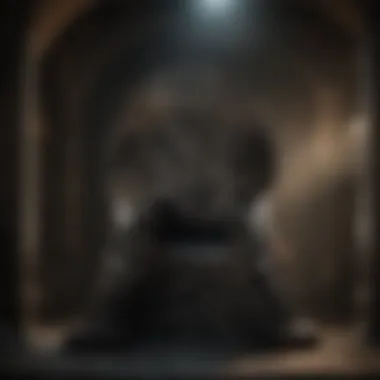
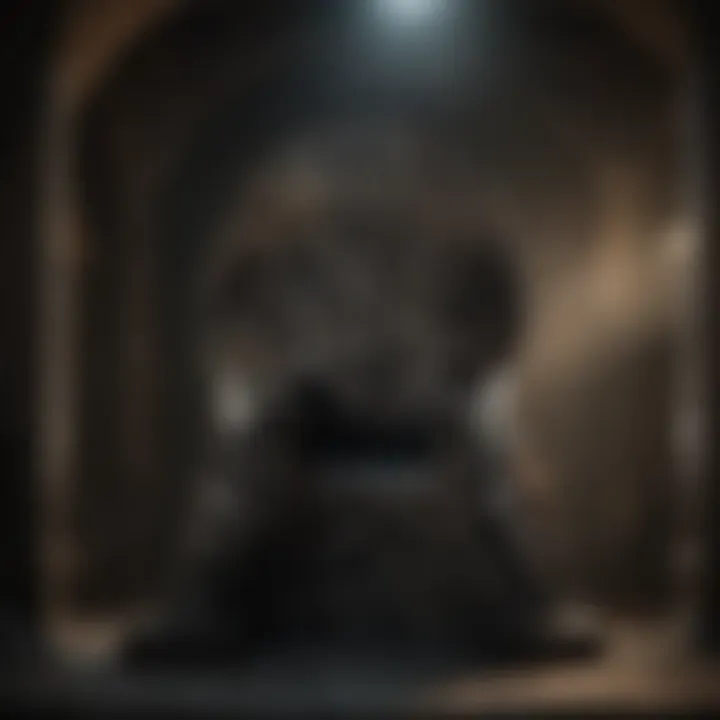
Major Themes Explored
The world of A Clash of Kings is woven with intricate threads of themes that reflect the human experience and the timeless struggles associated with power. Understanding these themes is crucial as they not only enhance the narrative but also offer readers profound insights into the motivations and behaviors of key characters. This section digs into four pivotal themes: The Nature of Power, Conflict and War, Family and Loyalty, and Betrayal and Morality. Each theme not only serves the plot but also resonates with the complexity of societal dynamics, making the story relevant even beyond its fantasy setting.
The Nature of Power
Power is like a double-edged sword in this narrative. Characters wield it, crave it, and, at times, are annihilated by it. Martin doesn’t shy away from portraying how power corrupts and distorts the moral fabric of individuals and societies. Tyrion Lannister’s rise to power contrasts notably with Stannis Baratheon’s rigid claim to the throne. While Tyrion seeks to outmaneuver others through wit and intellect, Stannis pursues power through a more traditional and aggressive route, relying on his perceived legitimacy.
Arguments can be made surrounding how power is defined. Is it sheer might? Or is it the subtle art of persuasion and influence? The text leaves this open to interpretation, allowing readers to examine their own perspectives on power structures. The shifts in power dynamics often reflect the volatile nature of real-world politics, urging readers to reflect on their own realities.
Conflict and War
At its core, A Clash of Kings is a tapestry of conflict, both grand and intimate. War serves as a backdrop for personal struggles, illustrating that larger battles often stem from deep-seated personal grievances. The Battle of Blackwater is a prime example, showcasing not only the clash of armies but also the clash of ideologies and ambitions. Individuals like Tyrion, who plays a crucial role in the defense of King's Landing, become emblematic of the idea that conflict is as much about strategy as it is about valor.
The novel portrays conflict not just as violence but also as negotiation, deception, and political maneuvering. In this realm, characters must constantly navigate between their principles and the brutal realities of their ambitions. The war serves as an allegory for the struggles faced in everyday life, reflecting how conflicts, even in less grand circumstances, can lead to either resolution or further discord.
Family and Loyalty
Family ties are like chains that bind characters to their fates, both liberating and constraining. The loyalty displayed by the Stark family underscores the importance of familial bonds in a world marked by treachery. Yet, these bonds are tested severely throughout the book. The notion of loyalty takes on various forms—from Robb Stark's loyalty to his father's values to Theon Greyjoy, who finds himself caught between his Stark upbringing and loyalty to his own family.
In a world where betrayal lurks around every corner, loyalty becomes a weapon and a weakness. This theme explores the complexities of allegiance, considering how loyalty can lead to either empowerment or downfall. A reader might ask, "What does loyalty truly mean when survival relies on often brutal choices?" The narrative challenges readers to reflect on the price of honor and commitment in a world that often prizes cunning over honesty.
Betrayal and Morality
Betrayal is perhaps the most defining aspect of A Clash of Kings, illustrating how moral compasses can skew in the pursuit of power. Characters constantly face choices that put their ethics to the test. The murder of Renly Baratheon by a shadow birthed from Melisandre’s dark magic is a stark instance where moral lines blur. It questions whether the end justifies the means.
The theme also examines the repercussions of betrayal. Characters such as Cersei Lannister and Petyr Baelish navigate through a realm where trust is a rare currency. Their actions, often driven by desperation and ambition, lead to disastrous consequences for themselves and others. The morass of betrayal pervades the narrative, leading readers to ponder the blurred lines between right and wrong.
"In this world, some may argue that loose morals are the first step to gaining an advantage, yet the wounds of betrayal often cut the deepest."
In exploring these themes, Martin not only captivates the imagination but also challenges readers to confront their perspectives on power, morality, and the essence of humanity. Each theme in A Clash of Kings serves as a mirror reflecting the complexities of the human condition.
Key Characters and Their Arcs
In A Clash of Kings, the interplay of power among the characters illustrates how ambition and loyalty shape the intricate web of politics and conflicts. Each character's journey offers depth to the overarching theme of power struggles, showcasing a diverse range of motivations, ideologies, and consequences in their quests for influence. Understanding these arcs allows readers to appreciate not just the characters themselves but also the broader narrative context in which they operate.
Tyrion Lannister's Political Maneuvering
Tyrion Lannister, often underestimated due to his stature, embodies the clever strategist lurking in the shadows. As the Hand of the King, he navigates the treacherous waters of King's Landing with a mixture of wit and intellect. His sharp tongue and ability to manipulate situations make him a formidable player in this lethal game.
Tyrion's approach to the realm is characterized by an appreciation for pragmatism over traditional authority. He understands that to wield power effectively, one must learn to read the room and adapt time and again. For instance, his decision to burn the effigies of Renly Baratheon serves both as a distraction and a political maneuver, ensuring that he remains integral to the unfolding drama.
He contrasts sharply with Cersei and his father, Tywin Lannister, who cling to brute force and intimidation. This juxtaposition highlights how intellectual acuity—Tyrion’s crowning strength—can shift the balance of power.
Stannis Baratheon's Claim to the Throne
Stannis Baratheon presents a unique dynamic within the power game, fueled by ambition and an unwavering sense of justice. His claim to the Iron Throne is saturated with a vengeance for honor following Robert's death. Unlike the other claimants, Stannis believes that his right to the throne is not merely a matter of blood but of duty. His steadfastness might appeal to some, yet it lacks the political savvy that sways others to his side.
He's often depicted as rigid and uncompromising, which leads to various fatal miscalculations. For instance, his alliance with Melisandre and the use of shadow to assassinate his brother Renly sets a tone of deceit and manipulation that breeds discontent among allies. Yet, his sense of righteousness and his heavy burdens make Stannis a character that evokes respect, even if he does not earn much love. His arc is a paramount example of how power can lead to isolating ambition rather than a camaraderie.
The Complexities of Jon Snow
Jon Snow stands as a linchpin in the saga, epitomizing the struggle between loyalty to family versus a broader moral responsibility. Throughout A Clash of Kings, Jon grapples with his identity as a Stark—not fully embraced due to his bastard status—and the duties that his position entails.
His enlistment in the Night's Watch adds layers to his character arc. The Wall is not just a geographical boundary but a representation of the moral choices he must make. As Jon navigates the tensions between the brothers of the Watch and the dangers beyond the Wall, he also confronts his sense of honor versus the pragmatism that later becomes synonymous with power.
The complexities within Jon’s character highlight the personal impacts of broader political struggles: family loyalty is worn like armor, yet can be both a shelter and a cage. His journey of self-discovery is pivotal as it draws a direct line from personal values to the concepts of loyalty and duty in leadership.
Daenerys Targaryen's Journey
Daenerys Targaryen's arc is a compelling exploration of rising from vulnerability to power. Initially a pawn in the game of thrones shaped by her brother Viserys, her journey turns when she embraces her identity as a Targaryen. Throughout A Clash of Kings, Daenerys transforms from a frightened girl into a determined leader.
Her relationship with the Unsullied and the formation of her own army serves to redefine her understanding of power. She evolves, recognizing that she must be more than just a claimant to the throne—she must embody the very essence of leadership that inspires loyalty and courage among those who follow her. Daenerys's use of fire, both literal and metaphorical, symbolizes her rebirth and the potency she wields as she prepares to take back what she believes is rightfully hers.
Moreover, her pursuit of dragons reflects her reclaiming of loss—further cementing her resolve to rise in a world that has brought her much suffering. Throughout the narrative, her story becomes a testament to how power can transform both the individual and the realm around them.
"Power resides where men believe it resides. It's a trick, a shadow on the wall." - Tyrion Lannister
By analyzing these characters, we can see that power in A Clash of Kings is not merely a goal but a complex journey laden with moral dilemmas, betrayals, and the ever-present risk of losing oneself to ambition. These arcs, in concert with the overarching themes of conflict and loyalty, provide a profound understanding of the human condition within the epic tale.
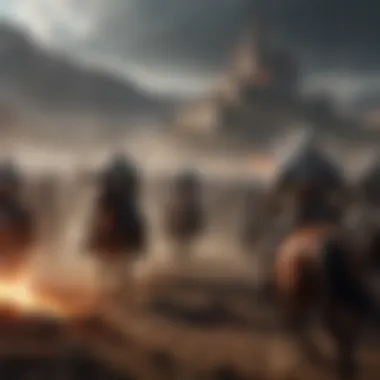
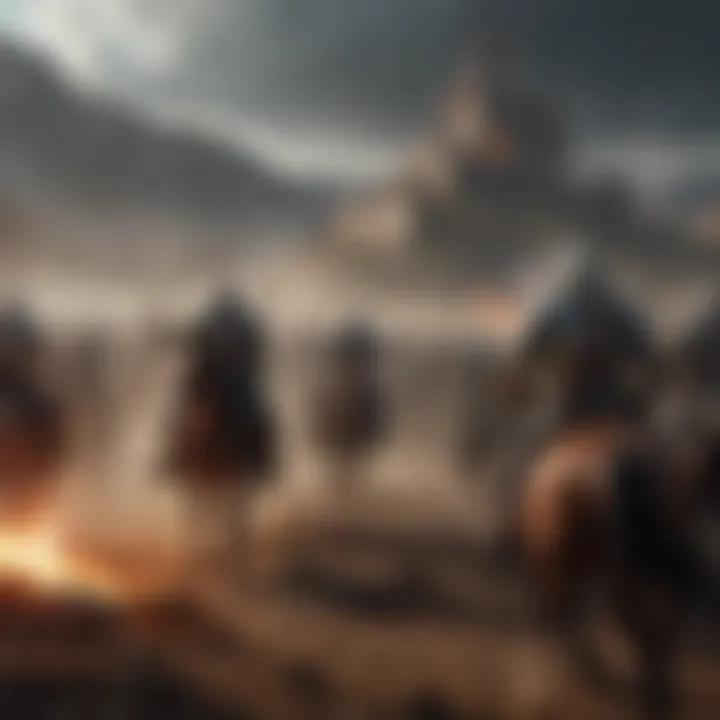
Critical Events and Their Impact
In the realm of A Clash of Kings, critical events are linchpins that not only steer the narrative but also breathe life into the complex web of power dynamics among its characters. The interplay of these events often highlights the fragility of alliances, the unpredictability of war, and the ever-shifting landscape of loyalty and betrayal. These moments are pivotal in shaping the destinies of the characters involved and their respective houses.
Understanding these events offers a clearer view of how George R.R. Martin intricately weaves individual motivations and broader socio-political themes, granting readers insights into the larger ramifications that each decision can precipitate.
The Battle of Blackwater
The Battle of Blackwater stands as a powerfully symbolic moment in the saga, showcasing the harsh realities of warfare and its influence on the political landscape of Westeros. This battle isn’t merely a clash of swords but a representation of desperation and hope. Tyrion Lannister’s ingenious use of wildfire to halt Stannis Baratheon’s fleet showcases not only military strategy but also the cunning required to navigate the treacherous waters of politics.
The stakes could not have been higher: a victory for Stannis would have meant the potential exodus of the Lannisters from the throne. With Tyrion at the helm, the battle unfolds with thrilling tension, allowing readers to reflect on the price of power and the lengths to which characters must go to preserve their positions.
"War is a series of calamities that lead to victory."
Here, Tyrion’s scheming nature comes to light, ultimately revealing how violence intertwines with astute political acumen. The chaotic imagery and visceral descriptions of the battle lend to a darker understanding of glory in war—often, it is accompanied by loss and suffering.
The Rise of Robb Stark
Robb Stark’s ascendance during this book signifies the awakening of both a man and a leader. As he gains traction following his father’s execution, he embodies the virtues of honor and bravery that many in Westeros admire. His victories in the field give him an air of invincibility, allowing him to rally his bannermen under the Stark banner.
However, Robb’s journey reflects the precarious nature of leadership. A willingness to forge alliances through marriage and the burden of expectations weigh heavily on him. Each military success bolsters support for his cause but also shines a spotlight on his eventual challenges. The interplay between ambition and duty plays a key role, ultimately foreshadowing the turmoil that comes when idealism encounters the brutal realities of power.
The Fall of Renly Baratheon
The downfall of Renly Baratheon is tragic yet illustrative of the fragility inherent in claims to power. Renly, despite his popularity and charisma, faces a sudden and ill-fated end during a moment overshadowed by magical elements and political treachery encapsulated in the character of Melisandre. His death, while shocking, serves as a reminder of the volatile nature of alliances and the unpredictable existence of the supernatural in this world.
Renly’s initial support from the lords of Westeros reflects the delicate fabric of trust and loyalty. Yet, his demise brings to the forefront the themes of sibling rivalry and the often cavalier attitude of those who see power as a game rather than a solemn responsibility. This event profoundly influences the war for the throne, altering the strategies of both Stannis and the Lannister factions, pushing them into deeper conflict.
In summary, these critical events in A Clash of Kings not only propel the story but also invite readers to ponder the larger implications of power struggles, individual choices, and the ripple effects they create across the realm.
The Role of Prophecy
Prophecy plays a significant role in 'A Clash of Kings,' serving as a thread that weaves together various narratives and character motivations throughout the book. It introduces an element of fate versus free will, creating an atmosphere of uncertainty where characters navigate their paths guided by, or in defiance of, foretold events. The presence of prophecy adds layers of complexity, prompting readers and characters alike to ponder the implications of believing in fate versus taking control of their destinies.
In particular, the character of Melisandre serves as a linchpin for the prophetic themes, revealing how power and belief intertwine. Her faith in the flames and the visions she claims to interpret lead her to make pivotal decisions that influence the course of the war. On a grander scale, these prophecies not only affect individual choices but drive the larger plot dynamics, illustrating how the uncertain future influences the present.
Furthermore, the story invites a critical examination of how prophecies can be interpreted in multiple ways, sometimes leading to unintended consequences. This duality underlines the unpredictability of power struggles, as characters like Stannis Baratheon and Daenerys Targaryen attempt to position themselves based on what they believe the prophecies dictate about their futures.
Melisandre's Influence
Melisandre stands as a paramount figure in 'A Clash of Kings,' exemplifying the potency of prophecy and its impact on the narrative. As a priestess of R'hllor, she is characterized by her unwavering certainty in the power of fire and visions from the flames.
Her interpretations shape the actions of key players, primarily Stannis Baratheon. For instance, she proclaims that Stannis is the prophesied hero, the One Who Was Promised. This belief, however, also creates a rift between Stannis and other factions, complicating alliances and exacerbating tensions.
Critically, her influence raises questions about moral ambiguity. The lengths she goes to fulfill these prophecies, whether through dubious decisions or manipulation, showcase the darker side of power. In her world, the end justifies the means, adding to the tapestry of conflict where faith and ambition clash.
The consequences of Melisandre’s beliefs can be seen in the book's climactic moments, where her actions play a direct role in battles and character fates, leaving readers to question the very nature of her prophecies. Are they genuine guidelines, or tools of manipulation?
The Implications of the Prophecies
The implications of the prophecies presented throughout 'A Clash of Kings' can be profound and multifaceted. They provide a roadmap, albeit a perilous one, for key characters who lean on prophetic declarations in hopes of achieving their ambitions. However, these predictions often come with irony, leading to disillusionment and unexpected outcomes.
- Fate and Free Will: This duality invites discussion among fans about to what extent characters are bound by predicted events versus forging their paths. For example, Stannis' adherence to Melisandre's prophecies leads him to chase a vision that may not align with reality.
- Moral Consequences: Key characters often find themselves making choices based on misconceptions of their roles within the prophecy. The struggles they face can be seen as reflections of their inherent desires versus the weight of expected destinies.
- Narrative Tension: Prophecies serve to escalate tension among the characters. As they react to these forecasts, the unpredictability of their actions creates rippling effects across Westeros, further emphasizing the power struggles that define the saga.
"The only thing we ever learn from history is that we learn nothing from history." - Hegel
Ultimately, the layered interpretations of prophecies in 'A Clash of Kings' highlight how knowledge of a potential future mingles with human instincts, resulting in a rich soil for conflict. Prophecies are not simply predictions; they create a lens through which characters and readers come to understand the stakes involved in the battles for power in Westeros.
Juxtaposition of House Strategies
The struggles for power in A Clash of Kings reveal the intricate game that houses play against one another. Understanding the juxtaposition of different houses’ strategies is essential for grasping the overall political landscape depicted in the novel. This interplay is significant because it highlights contrasting motivations and methods in pursuit of power, reflecting broader themes of loyalty, ambition, and consequence.
Lannister Tactics versus Stark Loyalty
When it comes to strategy, House Lannister and House Stark stand at opposite ends of the spectrum. The Lannisters, particularly led by Tywin, employ a cold, calculating approach. They manipulate political alliances, purchase loyalties, and do not hesitate when it comes to betrayal. This is evident in Tyrion Lannister’s cunning schemes in King’s Landing, where he uses information as a weapon and weaponizes those surrounding him, treating relationships as transactions rather than bonds.
In stark contrast, the Starks embody loyalty above all else. Their strategies are grounded in honor and duty, with Eddard Stark’s principles directing their decisions. For example, Robb Stark’s independence at Riverrun is marked by his refusal to abandon his moral compass, even when faced with politic choices that could save many lives.
"The things I do for love," a Lannister might say while pulling strings behind the scenes, while a Stark would counter, "The North remembers." This is the essence of their approach: one thrives in darkness while the other finds strength in integrity.


This clash between the Lannisters’ shrewdness and the Starks’ steadfastness underlines a critical observation. In the chase for the throne, the Lannisters often gain traction through deceit, reflecting a cynical view of power. The Starks, however, demonstrate the cost of unwavering loyalty in a world where moral choices can lead to devastating consequences.
This tension drives the narrative forward, allowing readers to contemplate broader questions about what it means to rule and the trade-offs between strength and honor in the cruel game of thrones.
Targaryen Vision versus Baratheon Tradition
Further complicating the power dynamics are the House Targaryen and House Baratheon, their strategies shaped by deeply ingrained traditions and distinct visions for the realm. The Targaryens, represented by Daenerys in this installment, seize power through a vision that includes breaking the wheel of oppression and freeing the oppressed, often appealing to emotions and idealism.
On the other hand, Baratheon tradition revolves around the concept of the rightful king holding the throne due to blood and lineage. Stannis Baratheon believes firmly in his claim and pursues the Iron Throne with a fierce resolve. His adherence to law and legitimacy sharply contrasts with Daenerys’s vision, where change is sought through revolution.
Baratheon strategies tend toward a rigid adherence to the old ways, which can be both a strength and a weakness. Stannis, for instance, taps into military force and the support of Melisandre’s prophecies, but he also fails to adapt when given the opportunity to unify forces. In the grander picture, this represents a clash not just of families, but ideologies that foreshadow larger conflicts.
In summary, exploring the disparate strategies of these houses doesn't just embellish the narrative; it enriches the overarching themes of power and morality. This examination offers a deeper understanding of the socio-political fabric of Westeros and reveals how deeply personal choices resonate on a national scale.
Symbolism and Motifs
In "A Clash of Kings," symbolism and motifs serve as essential conduits for understanding the deeper layers of the narrative. The symbols often act as mirrors reflecting the overarching themes of ambition, betrayal, and the perennial conflict that defines the struggle for power among the great houses of Westeros. Through the lens of symbol and motif, readers can uncover the salient messages that resonate throughout George R.R. Martin's intricate tale, enriching their comprehension of character motivations and the dire consequences of their actions.
The Growing Darkness
The concept of darkness is pervasive in the narrative, often signifying not just the absence of light, but also the moral degradation of characters as they succumb to their baser instincts. This motif can be traced through various arcs, guiding our understanding of transformation and loss amidst the chaos of war. Each character’s descent into darkness often marks a pivotal turn in their journey.
For instance, characters like Stannis Baratheon are seen struggling with the moral compromise of using dark forces to achieve his ends, demonstrating how the quest for power can skew one’s moral compass. The phrase "winter is coming" acts as a recurring hunch throughout the book, heralding the impending doom and hinting at the deeper, intangible darkness that lurks beyond the horizon.
Furthermore, the apparent abandonment of ethicality symbolizes the broader decay of the realm, highlighting that the thirst for power can lead individuals down treacherous paths. Ultimately, the growing darkness reflects the human condition itself — a curious contemplation of how far individuals are willing to tread into moral ambiguity for the sake of ambition.
Fire and Ice
The juxtaposition of fire and ice constitutes one of the most striking motifs in "A Clash of Kings." These elemental symbols embody opposing forces, representing not only the physical conflicts within the story but also the internal struggles faced by its characters. While fire signifies passion, destruction, and rebirth—linked notably to Daenerys Targaryen and her dragons—ice denotes coldness, detachment, and death, manifesting in characters like Jon Snow and the White Walkers.
This dichotomy creates a structural framework through which Martin emphasizes the complexity of power dynamics at play. Daenerys, associated with fire, illustrates the fiery ambition and transformative aspects of leadership; she seeks to reclaim her family’s throne with fervor, although she also dances on the edge of tyranny. Conversely, Jon Snow embodies the icy virtue of honor and duty, rooted deeply in the traditions of the Night’s Watch.
"The things I do for love," is a haunting reminder that love can ignite powerful forces—metaphorically likening it to fire in its ability to both unite and divide, revealing how closely they walk the line between love and hate.
In essence, the interplay of fire and ice renders a dynamic tableau where power is continually contested, with characters caught in the midst of their climactic struggles. This motif serves not only as a thematic enhancement but also as a profound commentary on the human experience, illuminating the choices individuals make when confronted with the inevitable clash of opposing forces.
Literary Techniques
In examining 'A Clash of Kings,' it becomes evident that literary techniques play a crucial role in shaping the narrative. These techniques not only engage the reader but also deepen the understanding of characters, motivations, and overarching themes. The precision with which George R.R. Martin employs various techniques immerses the audience in the complex world of Westeros, making every twist of fate and every act of treachery resonate. In this section, we delve into the importance of two key literary techniques: point of view and foreshadowing, alongside symbolic imagery.
Point of View and Perspective
Martin's choice of point of view is one of the defining features of 'A Clash of Kings.' By utilizing multiple perspectives, he allows readers to experience the political and emotional landscapes through the eyes of diverse characters. Each chapter typically centers on a different character’s point of view, revealing their thoughts, desires, and fears. This technique fosters a rich tapestry of narratives that highlights the fragmented nature of power and loyalty in this tumultuous time.
For instance, Tyrion Lannister's sharp wit clashes with Jon Snow's idealism, creating two contrasting lenses through which to view the dynamics of power. Tyrion's cunning approach to governance and warfare underscores the duplicitous nature of leadership, whereas Jon’s struggle to find his identity in a world rife with betrayal emphasizes morality amidst chaos.
"The right man in the wrong place can make all the difference in the world."
This quote could summarize the disparate narratives that converge in the book. Each character’s viewpoint reveals a fragment of the truth, presenting a multifaceted tableau of motivations and consequences that elevate the complexity of the story.
Foreshadowing and Symbolic Imagery
Foreshadowing in 'A Clash of Kings' serves as a critical thread that ties together various story arcs, hinting at future events while retaining a sense of intrigue. Martin is skilled at laying the groundwork for potential outcomes, often through subtle clues nestled in dialogue or descriptions.
The direwolves, for example, symbolize not only loyalty but also the fates that await each Stark child. As the narrative unfolds, moments that might seem innocuous hint at darker events to come, creating a sense of impending doom.
Imagery plays a heightened role as well. The continuous interplay of fire and ice, which serves to embody the conflicting forces in the series, crops up throughout the text both literally and metaphorically. Whether it's Daenerys's dragons or the chilling winds from the North, these symbols anchor the reader in the larger themes of loss, conquest, and survival.
In summation, Martin’s use of literary techniques such as varied points of view and foreshadowing creates an enriched narrative that invites readers to engage on a deeper level. It allows the story to breathe, making it as engaging as the underlying themes of power, loyalty, and betrayal.
End
In summarizing the exploration into 'A Clash of Kings,' we shine a light on several compelling elements that reiterate the novel's lasting impact within the A Song of Ice and Fire series. The importance of this work cannot be overstated; it serves as a crucible where myriad narratives and characters intermingle, revealing insights into the nature of power, loyalty, and vengeance. As with many significant middle chapters in literary sagas, this installment molds the path for future developments and paints a vivid portrayal of a world teetering on the brink of chaos.
The Legacy of 'A Clash of Kings'
The legacy left behind by 'A Clash of Kings' persists through its intricate web of political machinations and character developments. Notably, the book lays the groundwork for future conflicts that resonate throughout Westeros, granting readers a panoramic view of how leadership and ambition govern the actions of key figures. Tyrion Lannister, standing out as a master of strategy, continually navigates the treacherous waters of King's Landing. His resourcefulness and wit not only keep his head above water but also set the tone for forthcoming narratives involving the Lannisters.
But it’s not only Tyrion who captures attention; Daenerys Targaryen's resolve burgeons as she wrestles with her identity and mission. Her evolution throughout the book exemplifies the trials that shaped her character as well as her destiny. Furthermore, the pitfalls faced by Stannis Baratheon and Robb Stark reveal the often grim reality of the power struggle within noble families. Each character's path intertwines with the political landscape, affording readers a chance to delve into the consequences of each decision made under the weight of crown and duty.
Reflection on Subsequent Events
Post-'A Clash of Kings,' the cascading effect of its events unfolds into the subsequent volumes, shaping alliances, rivalries, and the ultimate fate of the Seven Kingdoms. Those who delve deeper into this world begin to witness how earlier political maneuvers echo down the hallways of time, igniting future feuds and echoing themes of betrayal and loyalty.
The Battle of Blackwater, for instance, reverberates throughout the series, with its tactical nuances and dramatic outcomes placing it on a pedestal as a defining moment for characters involved. Failing to account for its implications would be akin to turning a blind eye to the looming shadows stretching past the pages.
In reflecting on these successive phenomena, we see a brutal reminder of how the characters’ choices do not merely impact their own fates but ripple through the narrative fabric, weaving an intricate tapestry of cause and effect that holds true to the very essence of conflict in this grand saga.
"Power resides where men believe it resides. It’s a trick, a shadow on the wall."



